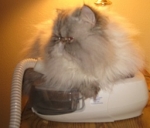jccameron wrote:Bleeping Beauty, thanks for the quick reply and feedback. I really do appreciate it.
Unfortunately, my natural circadian rhythm is a late night one. I usually get to bed between midnight and 1AM and up between 8-9AM. That's huge improvement over the past both in actual time in bed and when I am able to get to bed. My goal is to get it back down one more hour (between 11PM and midnight) but right now that is secondary.
Mine was, too. Former confirmed night-owl here. But I'm now in bed well before 11:00 most every night, and I'm sleeping better than I ever have before. Keep working on an earlier bedtime, and I bet you'll see good results from the effort.
As for the amount of time in bed, it is generally within reasonable guidelines (7-9 hours). I am just struggling to keep the mask on the whole time - I often wake up in the morning to find it off and have no memory of taking it off. I am getting more comfortable with it on so my hope that this issue will decrease with time and I'll keep it on longer and longer each night.
It's not uncommon to remove the mask during the night (and not remember doing so) in the early days of therapy. It's good that you're becoming more comfortable with it. But frankly, any time you spend in bed without the mask on is useless, from a therapy standpoint. It's counter-productive. Some people use medical tape around the outer edge of the mask, sticking it to their face; if they subconsciously try to remove the mask in the middle of the night, the tape will pull at their skin, reminding them to keep the mask on. Or you might try wearing mittens to bed, so you don't have the dexterity needed to remove the mask easily, and you'll wake up enough to realize you're doing it.
As for the leaks, yes, that was my concern and a big reason why I wanted to get the data. I've had a couple of days where the bridge on my nose was red and pretty sore so trying to find that perfect fit. Unfortunately, because of nasal issues (deviated septum) I am a mouth breather and need a full mask.
I wear a full-face mask, too. The trick, with any mask, is getting it to fit you well with little leaking. Small adjustments are best when it comes to masks. Re: making changes or adjustments to your therapy, do those one thing at a time, and give each change a few nights before making any further adjustments. You need to be able to isolate and identify what works for you and what doesn't.
As for the range, I did lower the max from 11 to 10 to see if I could get used to the max over a time. I am starting to get a better appreciation for how everything works and it sounds like you might be right but am waiting for more detail and a chance to talk with a specialist or my doctor.
Talking with your physician is a good idea. But I think both Hawthorne and I were advising you to raise the pressure a bit (especially the minimum). You're spending a good deal of time at the ceiling pressure of 10, which would indicate that the machine would go higher if it could, but it's impossible to say that for sure until the leaks are controlled.
As it stands, you can't really trust your AHI numbers (or determine your actual pressure needs) because your leaks make the rest of the data suspect. (The pressure might be rising to the ceiling simply because your leaks are so high that the machine can't compensate for them.)
jccameron wrote:
My original sleep report says that my AHI was reduced to under 5 with a pressure of 8cm or higher. I assume that this is my titration number?
Sounds like it. So I question why your range is 5-10cm, if it takes 8cm to bring your AHI into normal range. I'm no expert, but I'd set the minimum pressure at 7cm. 5 is way too low for most of us, and if 8 is needed, why start at 5?
Thanks again (for both your posts) and I am going to increase the min tonight and work on getting the leaks lowered.
Good plan, jc. Keep us posted.






















